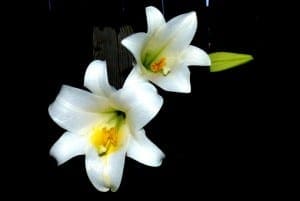 Mimi Noonan, DVM, DACVIM – Springtime holiday flowers and gift bouquets spark anxiety for veterinarians, particularly those who love cats. The lovely tradition of sending lilies around this time of year dramatically increases the chances that we will see cats with kidney failure.
Mimi Noonan, DVM, DACVIM – Springtime holiday flowers and gift bouquets spark anxiety for veterinarians, particularly those who love cats. The lovely tradition of sending lilies around this time of year dramatically increases the chances that we will see cats with kidney failure.
Lilies (all kinds) are toxic to cats: tragically toxic. If a cat ingests any part of a lily plant, they are in danger of dying.
Lilies should never be in the house with a cat; they are naturally curious and some seem actually drawn to the flower. In fact, many of the cat intoxications we see are from well-meaning owners who put their bouquets “out of reach”.
 The toxicity of lilies is unique to cats. Dogs will occasionally have stomach upset after eating lilies, but no toxicity has been reported. No other species of animal has been noted to have the sensitivity that cats have to lily plants.
The toxicity of lilies is unique to cats. Dogs will occasionally have stomach upset after eating lilies, but no toxicity has been reported. No other species of animal has been noted to have the sensitivity that cats have to lily plants.
When a cat chews on, licks or ingests any part of a lily plant, they may not show any signs of illness right away. Within a few hours, many will show stomach upset and lethargy. The tragic issue is that lilies will damage a cat’s kidneys irreparably within a short time of exposure.
Thankfully, early and aggressive treatment of cats exposed to lilies can often prevent the dangerous loss of kidney function. If a cat is known to have chewed on a plant, a veterinarian will make the cat vomit, then give a coating agent to prevent further absorption of toxins and fluids to protect the kidneys. Patients treated rapidly often make a full recovery, with no long-term kidney damage.
Patients that come in already showing signs of kidney damage do not have as hopeful a prognosis, though many can be saved with intensive care. Some will have a life-limiting loss of kidney function that often requires a long-term commitment to manage.
The best way to prevent lily intoxication is to completely eliminate lily plants or flowers from any home with a cat! When sending flowers, let the florist know that you do not want any lilies in the bouquet of your cat-loving friends.
Most veterinarians prefer cats to be exclusively housed indoors for a lot of safety reasons, the prevalence of daylilies being one of them. Daylilies are inexpensive, low-maintenance, perennial plant that has the potential to endanger outdoor cats. Families of these kitties often won’t know about the exposure until it is too late to save their pet.
If you suspect that your cat has been exposed to a lily plant, please seek immediate veterinary care or come directly to Veterinary Specialty Center.
Dr. Mimi Noonan is an Internal Medicine Specialist at Veterinary Specialty Center.
Accidents and illnesses do happen to pets, even when you follow pet safety tips. Veterinary Specialty Center’s Emergency and Critical Care Department is open 24 hours a day, 365 days a year. Our 24-hour emergency facility is located at 2051 Waukegan Road in Bannockburn and we can be reached at 847.459.7535. If you’re coming into our emergency room, it does help to call in advance if possible or get in line online for non-urgent cases.
Recent Posts
About Us
Veterinary Specialty Center is a privately-owned, 24/7 emergency and specialty animal hospital located in Bannockburn, IL. Since 1976, their team of board-certified specialists has delivered advanced, compassionate care, leading the way with innovative treatments and a collaborative approach.
